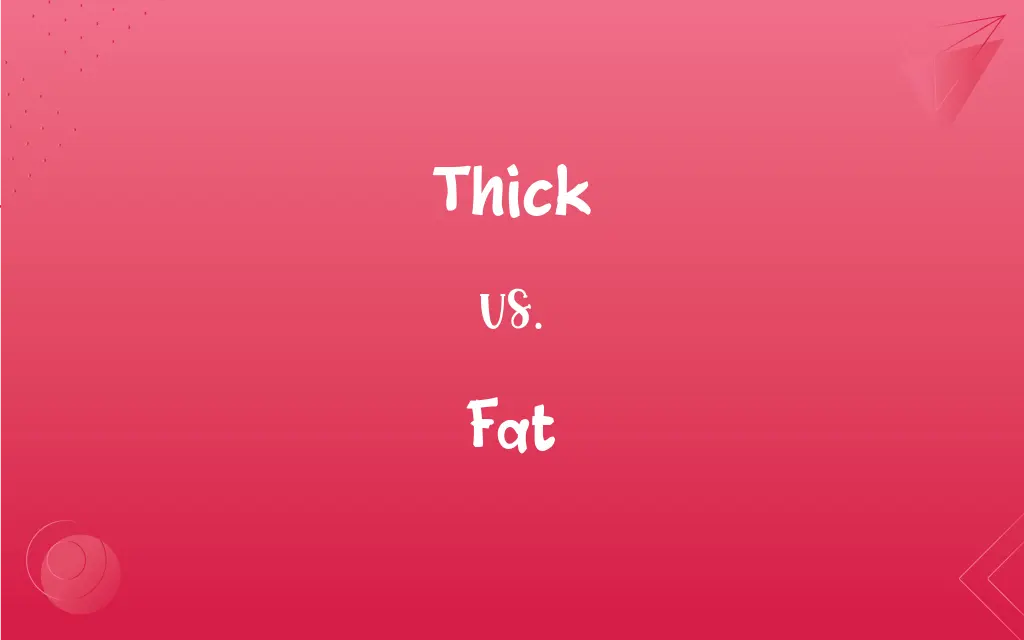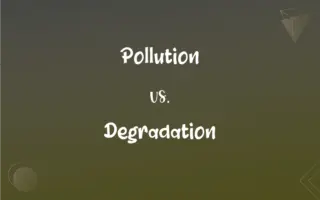Thick vs. Fat: What's the Difference?
Edited by Aimie Carlson || By Janet White || Published on December 15, 2023
"Thick" describes something with substantial depth or density, while "fat" often refers to the excess bodily tissue or richness in food.

Key Differences
Thick is used to describe an object's width or depth relative to its other dimensions, implying a considerable extent from one surface to its opposite. Fat, however, is typically used in the context of living beings, referring to the accumulation of excess flesh.
In the context of materials, thick suggests a substantial or dense structure, like a thick book or a thick layer of paint. Fat is less commonly used in this context but can describe richness or abundance in composition, like fat in food.
Thick can also describe a consistency that is dense or not fluid, as in thick soup. In contrast, fat is often used to describe the nutrient found in food that is essential for a balanced diet but can be unhealthy in excess.
In figurative language, thick can describe the atmosphere (thick with tension) or understanding (thick-skulled). Fat is sometimes used metaphorically to imply abundance or excess, as in a fat paycheck.
Thick generally has a neutral or positive connotation in various contexts, while fat can have negative connotations, especially when referring to body size, and should be used sensitively.
ADVERTISEMENT
Comparison Chart
Context of Use
Width/depth of objects, consistency.
Body tissue, richness in food.
Common Usage
Describing dimensions or dense materials.
Referring to bodily tissue or food content.
Connotations
Generally neutral or positive.
Can be negative, especially about bodies.
Figurative Use
Atmosphere, understanding.
Abundance, excess.
Example Objects
Books, layers of paint, soup.
Bodily fat, fats in food.
ADVERTISEMENT
Thick and Fat Definitions
Thick
Thick describes something with considerable depth.
The walls were so thick that no sound could pass through.
Fat
In a metaphorical sense, fat can imply excess or abundance.
He landed a fat bonus at the end of the year.
Thick
Thick can refer to a dense or heavy consistency.
She enjoyed the thick and creamy texture of the milkshake.
Fat
Fat can describe the richness of food, especially in terms of oil or grease content.
The recipe called for a tablespoon of animal fat.
Thick
In a non-physical sense, thick can describe density of atmosphere or ideas.
The room was thick with suspense during the announcement.
Fat
Fat also refers to a group of natural substances in food that are essential in small amounts.
Nutritionists recommend a balance of protein, carbohydrates, and fat in the diet.
Thick
Thick is used for materials with substantial width.
He cut a thick slice of bread for his sandwich.
Fat
Fat refers to the natural oily substance in animal bodies, stored for energy.
The diet focused on reducing unhealthy body fat.
Thick
Thick can imply limited understanding or obtuseness.
They jokingly called him thick-headed for missing the obvious hint.
Fat
Fat can be used derogatorily to describe excessive body weight.
The term fat should be used with sensitivity to avoid offending.
Thick
Relatively great in extent from one surface to the opposite, usually in the smallest solid dimension; not thin
A thick board.
Fat
The ester of glycerol and one, two, or three fatty acids.
Thick
Measuring a specified number of units in this dimension
Two inches thick.
Fat
Any of various soft, solid, or semisolid organic compounds constituting the esters of glycerol and fatty acids and their associated organic groups.
FAQs
Can 'thick' describe a liquid's consistency?
Yes, 'thick' can describe a dense or viscous consistency in liquids.
What does 'thick' imply in physical dimensions?
'Thick' implies substantial depth or width in an object.
How is 'fat' used in the context of nutrition?
'Fat' refers to a nutrient in food, essential in small quantities for a balanced diet.
Is 'thick' used in a metaphorical sense?
Yes, 'thick' can metaphorically describe a dense atmosphere or slow understanding.
Can 'thick' be used in a positive context?
'Thick' often has neutral or positive connotations, like in 'thick and healthy hair.'
How is 'fat' used metaphorically?
Metaphorically, 'fat' can imply abundance or excess, like a 'fat' paycheck.
How does 'thick' relate to clothing material?
'Thick' clothing suggests heavy or substantial fabric, ideal for warmth.
What does 'fat-free' mean in food products?
'Fat-free' indicates that the food contains no or negligible amounts of fat.
What does 'fat' mean in relation to body composition?
'Fat' refers to the accumulation of excess fatty tissue in the body.
Are there negative connotations to using 'fat'?
Yes, 'fat' can have negative connotations, especially when referring to body size.
Can 'thick' refer to a person's mental capacity?
Colloquially, 'thick' can imply slowness in understanding, though it's often informal or humorous.
What's a sensitive way to refer to body fat?
Referring to 'body fat' or 'body composition' is more sensitive than just 'fat.'
How is 'fat' important in a balanced diet?
'Fat' is important in a diet for energy, nutrient absorption, and cell function.
What is an appropriate use of 'fat' in diet?
In diet, 'fat' is used to describe essential dietary fats necessary for health.
Can a rope be described as 'thick'?
Yes, a rope can be described as 'thick' if it has a large diameter.
Can 'thick' be used to describe a person's hair?
Yes, 'thick' hair refers to hair that is dense or has a lot of volume.
What is the difference in using 'thick' and 'fat' for humor?
'Thick' can be humorous in a light-hearted way, while 'fat' should be used cautiously due to potential sensitivity.
Does 'thick' have a specific meaning in culinary terms?
In culinary contexts, 'thick' often refers to the consistency of sauces or mixtures.
Is it accurate to describe a book as 'fat'?
While 'thick' is more appropriate for dimensions, 'fat' can be a playful descriptor for a very long book.
Is 'fat' used in financial contexts?
Yes, 'fat' can be used to describe large amounts of money or profits.
About Author
Written by
Janet WhiteJanet White has been an esteemed writer and blogger for Difference Wiki. Holding a Master's degree in Science and Medical Journalism from the prestigious Boston University, she has consistently demonstrated her expertise and passion for her field. When she's not immersed in her work, Janet relishes her time exercising, delving into a good book, and cherishing moments with friends and family.
Edited by
Aimie CarlsonAimie Carlson, holding a master's degree in English literature, is a fervent English language enthusiast. She lends her writing talents to Difference Wiki, a prominent website that specializes in comparisons, offering readers insightful analyses that both captivate and inform.






































































